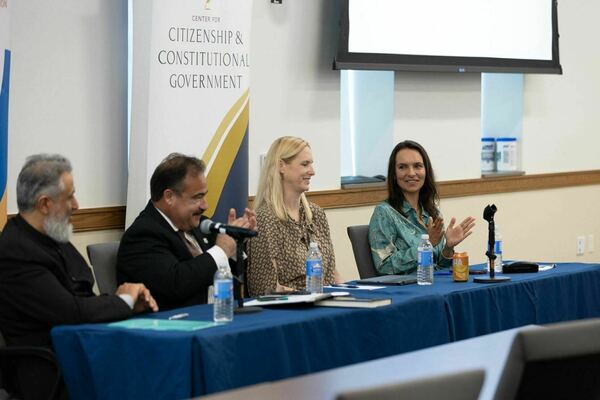
On September 7, 2023, the Center for Citizenship and Constitutional Government hosted a panel discussion celebrating the release of The Peaceful Resolution of Territorial and Maritime Disputes by Dr. Emilia Justyna Powell (University of Notre Dame) and Dr. Krista E. Wiegand (University of Tennessee, Knoxville). Professor Powell is a CCCG affiliated faculty fellow. This event was co-sponsored by the Kellogg Institute for Global Affairs, the Kellogg Institute's Lab on Constitutionalism and the Rule of Law (CAROL), and the Rafat and Zoreen Ansari Institute for Global Engagement with Religion.
The panel consisted of both authors of the book, as well as Sheikh Dr. Abdulrahman al-Salimi, an official in the Ministry of Endowments and Religious Affairs in the Sultanate of Oman and a scholar of early Islamic political and theological thought.
Dr. Powell began by explaining how conflicts over territorial boundaries are not taking place in the world of theory, but in the real world. They affect the lives of thousands of people and therefore a discussion of territorial and maritime disputes requires the perspectives of the people actively involved in them.
Dr. Powell followed up with a discussion of the importance of maritime and territorial disputes to geopolitics. Due to the stress and harm caused by territorial and maritime disputes, Dr. Powell says, it is essential that states find a way to resolve these disputes peacefully. Dr. Powell then described the different avenues states can pursue in resolving these disputes, from arbitration in the international courts and negotiation between governments to use of force. “It's all about strategy,” she remarked, when describing why a state might choose arbitration or violence versus private negotiation. To contextualize this, Dr. Powell discussed the strategies that states might employ to win their specific case.
Dr. Wiegand followed up with a discussion of a current maritime conflict in the South China Sea. By describing the current conflict between China and the Philippines, Dr. Wiegand was able to elaborate on the strategy that goes into arbitration processes specifically. Dr. Weigand used this example to explain the pros and cons of pursuing arbitration in international court, as well as to illustrate the depth of the issue in real life.
In recognition of the two authors and their book, the Sheikh described the authors as “two streams flowing into one and the same river,” praising the way that they combined their strands of research into a compiled book. He also commended the way in which they incorporated real world examples into their book, citing the prudence of their methodology. According to the Sheikh, the book threads the line between being too practical or too theoretical and therefore provides an outstanding piece on the state of territorial and maritime disputes.
Dr. Emilia Powell is a Professor of Political Science and Concurrent Associate Professor of Law at the University of Notre Dame. Prior to co-authoring The Peaceful Resolution of Territorial and Maritime Disputes with Krista E. Wiegand, she wrote the 2020 book Islamic Law and International Law: Peaceful Resolution of Disputes, for which she won two best book awards from the International Studies Association (ISA).
View the recording here.
This article was contributed by CCCG Writing Fellow Luca Fanucchi